Verdict
These sensibly priced earphones are easy to get on with thanks to their long battery life. Make sure you’re fine with the lack of active noise cancellation first, though, and that you can get more dynamic-sounding pairs for similar money.
Pros
- Long battery life
- Fairly affordable
- Inoffensive sound
Cons
- Rivals sound more insightful or engaging
- No active noise cancellation
Introduction
The Yamaha TW-E3C are simple, moderately priced true wireless earphones for the person who can not, or does not want to, splash out on the biggest names like Trusted Reviews favourite the Sony WF-1000XM4.
They are easy to live alongside. The Yamaha TW-E3C have long battery life, decent water resistance and a small charge case.
Active noise cancellation is the big missing feature. While not a nailed-on expectation at this level, some rivals have it. And it makes noisy forms public transport much more bearable.
Sound quality can’t match budget heroes like the Lypertek PurePlay Z3 either. While there are no lurid excesses, like muggy and bloated bass, as you’d expect from Yamaha, the TW-E3C’s mid-range granularity does a lot of vocal lines few favours.
Design
- Simple plastic design
- Scuff-prone case
The Yamaha TW-E3C are all-plastic true wireless earphones that come in blue, white, black and red finishes. They are light, comfortable and unobtrusive.

Yamaha’s logo, a trio of interlocking tuning forks, means lots of people won’t know who made your earphones from a glance either.
They include a colour-matched charging case that is light and petite. However, its textured plastic surface is easy to scuff. Within 24 hours it didn’t look so new anymore. A few weeks on, you can now see a patchwork of more glossy areas that have worn down — and these earphones have not been on any big adventures in that time.
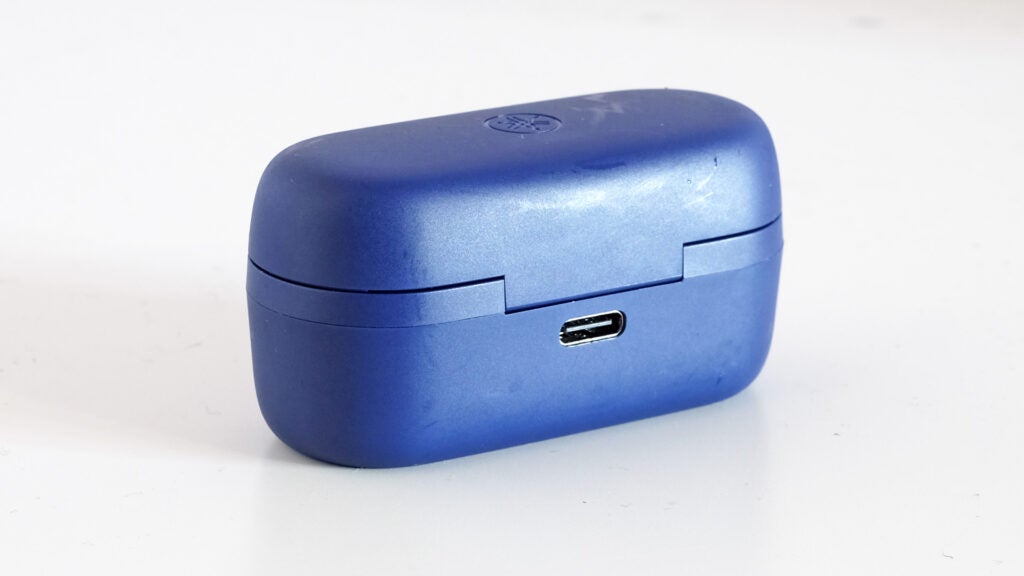
Yamaha’s simple approach to the outer hardware of the Yamaha TW-E3C does have some knock-on effects. These earphones have no physical buttons. Instead, the back of each earpiece acts as a capacitive touch surface.
This means that if you leave the Yamaha TW-E3C out of your ears, with no music playing for a sufficient period, you’ll need to put them back in the case to get them to turn back on. I’d much rather have physical buttons that let you occasionally not get the case involved, as someone with a habit of leaving gadgets on any surface with enough space for them.
Still, the capacitive controls do work well enough. Single and double taps on the earpieces control music, while long presses alter volume.
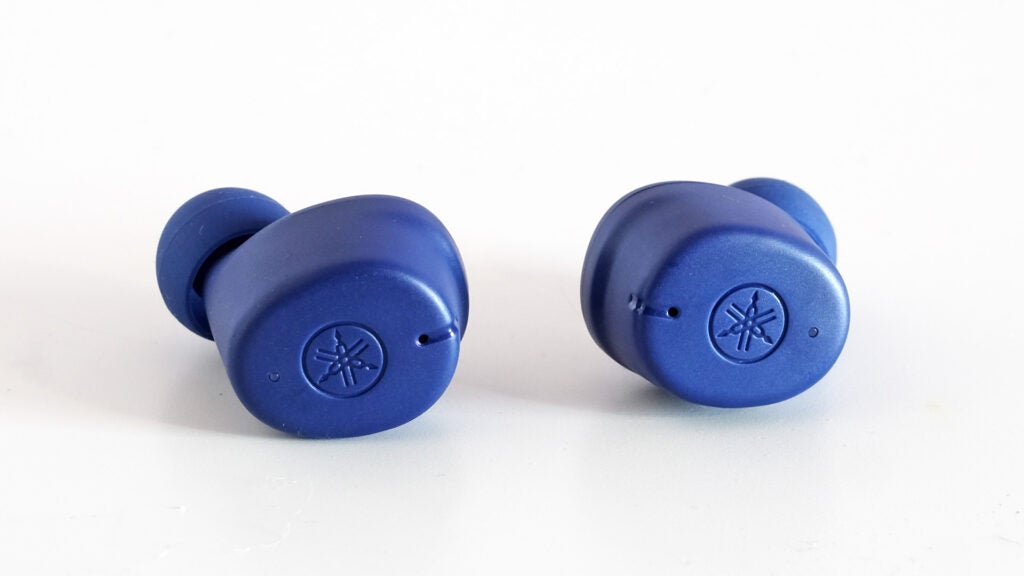
Features
- Long battery life
- Transparency mode
The Yamaha TW-E3C do not have advanced features like active noise cancellation. It’s a significant drawback for use on public transport, because silicone tips can only do so much. But it does help Yamaha achieve this pair’s IPX5 water resistance – meaning copious sweat is no problem, but you shouldn’t try to wash this pair under a tap.
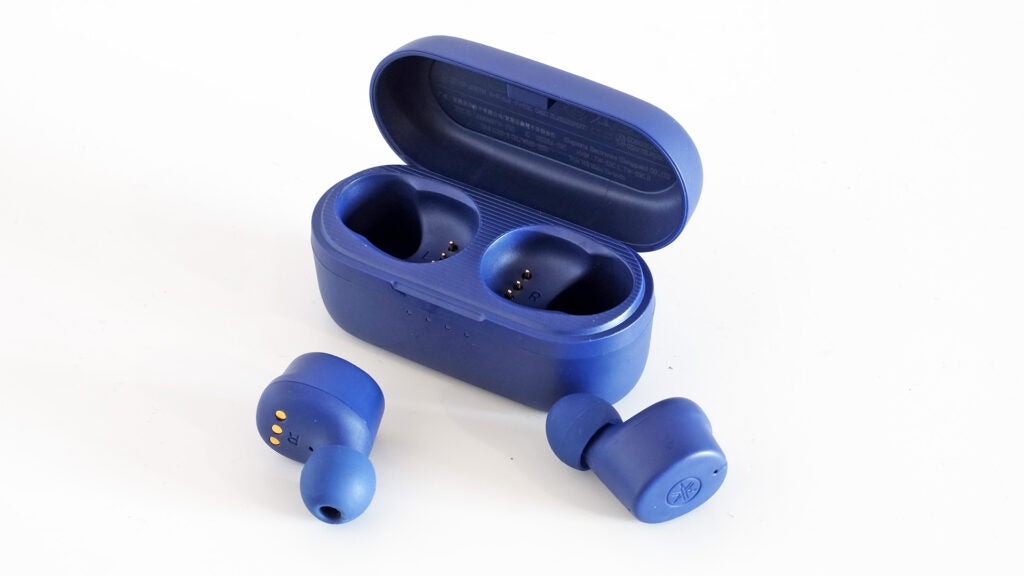
The case provides a little under two additional charges according to Yamaha’s stats, and that seems about right considering what the case’s own LEDs report. Four white LEDs show an estimate of the case’s own battery level when on charge.
These earphones’ battery life is excellent, rated at nine hours per charge. These earphones also have an ambient sound mode, which pipes outside noise through the drivers. It’s OK, but doesn’t have the almost strangely natural quality of a more advanced pair. This is more like an ambient mode of a few years ago.
Sound Quality
- Inoffensive but not class-leading audio
- Fibrous mids
The Yamaha TW-E3C use small 6mm dynamic drivers, which often sound great, and these earphones have solid codec support. There’s AAC for iPhones, aptX Adaptive for the Android crowd.
These are also the worst kind of earphones to review, the type that sounds decent enough but is not class-leading and does not make any huge tuning missteps. Audio quality is fine, but did not stand out to me on a first listen as, for example, the Lypertek Pureplay Z3 did. And that impression hasn’t really changed much over the weeks.
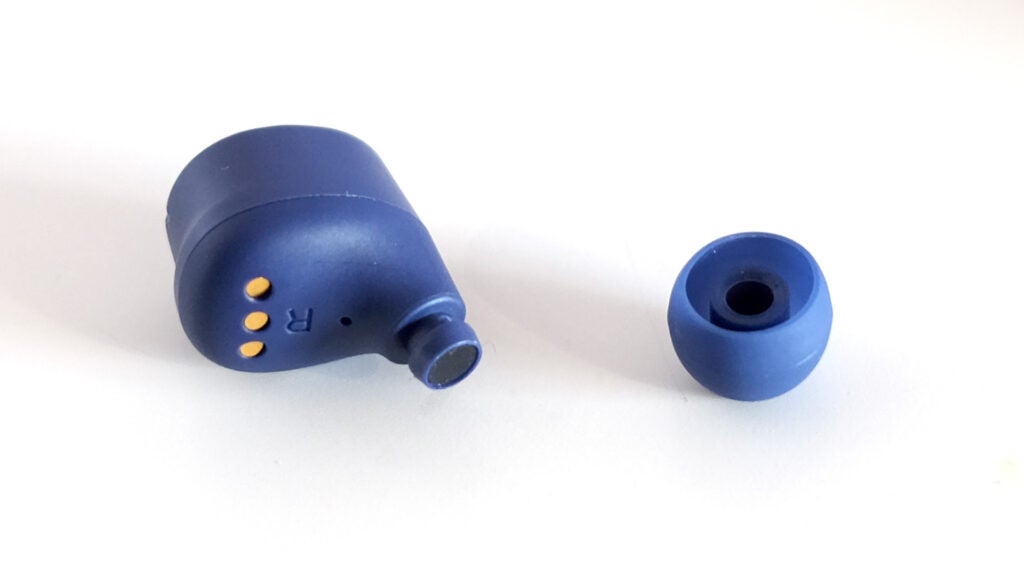
The Yamaha TW-E3C have the classic mainstream slight bass emphasis, but it doesn’t go treading over everything else like muddy boots on carpet. General coherence is solid, and they put across a reasonable impression of being tonally balanced without the kind of strict, austere style that would arguably be a bad fit for a reasonably affordable pair of true wireless earphones.
I don’t find these earphones sibilant, but I do think their upper mids can sound a little raw and fibrous with some material. It’s not enough to make them fatiguing — I’ve used the Yamaha TW-E3C for hours at a time regularly — but is a sign these earphones are a cost-conscious pair.
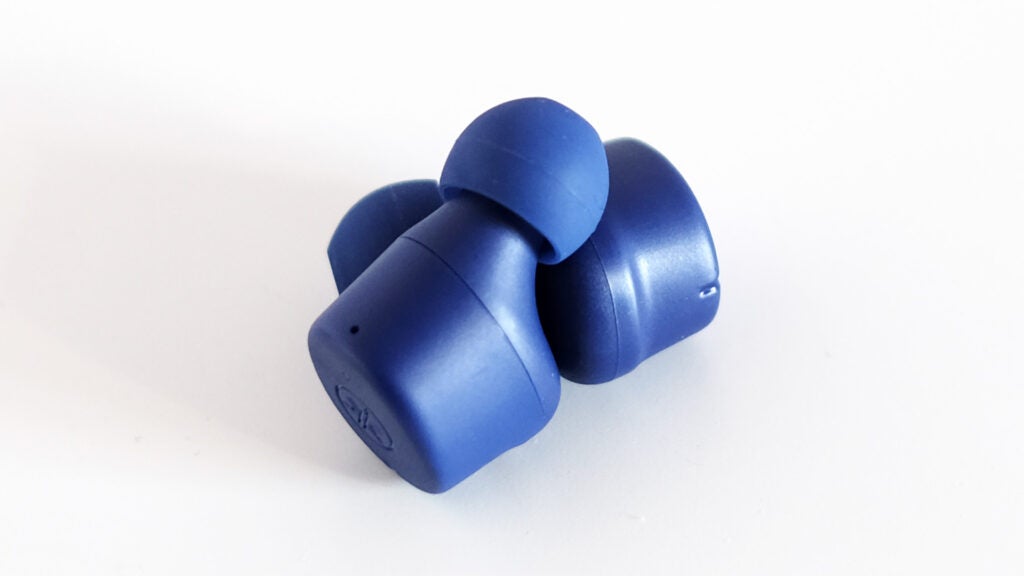
Transparency is no more than on-par for the money, and dynamics are a touch muted. However the largely even-keel approach Yamaha has adopted means you’re unlikely to run into any genres the Yamaha TW-E3C suddenly doesn’t get along with at all.
As someone who thinks sound quality always comes first with headphones and earphones, I’d suggest taking a look at pairs like the Lypertek Pureplay Z3 and the Cambridge Audio Melomania Touch. They have a little more about them sonically.
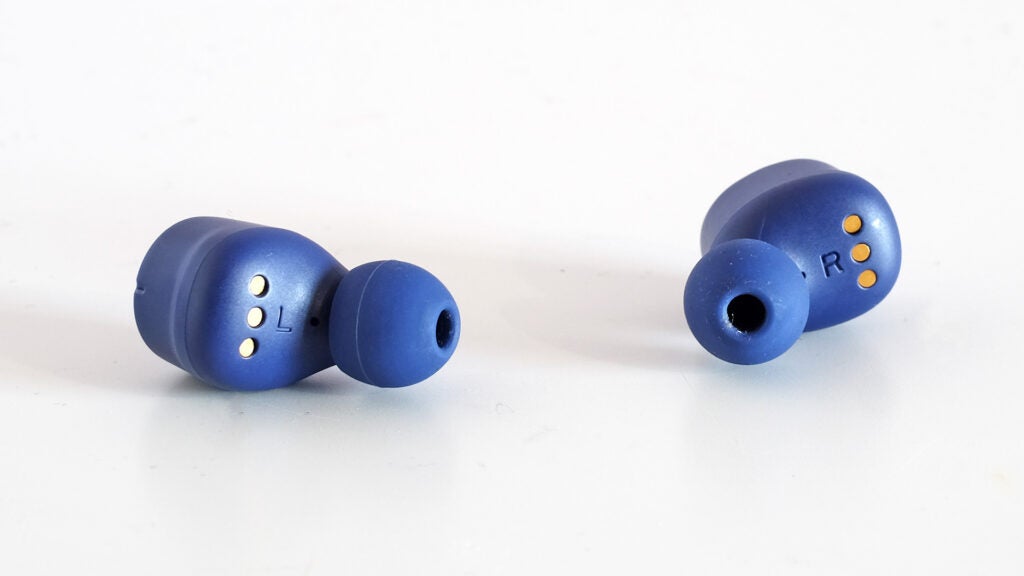
Latest deals
Should you buy it?
Long battery life and good-enough water resistance: The Yamaha TW-E3C are a sound option for those who want a pair to use while exercising, or simply a pair that doesn’t require too much upkeep.
Jack of all trades, master of none: Likeable as they are, the Yamaha TW-E3C are not stand-outs in any area. You can get more involving earphones for similar money, and even pairs with active noise cancellation, which can really take the stress out of noisy environments.
Final Thoughts
The Yamaha TW-E3C are solid true wireless earphones that last a good long while off a charge — handy if you’ve been put off this style for years at the prospect of a pair that will run out of juice after just four hours.
They sound decent too, although I think they are bettered by pairs from Trusted Reviews true wireless favourites like Cambridge Audio and Lypertek.
The main thing to bear in mind before buying here, though, is that the Yamaha TW-E3C don’t have any form of active noise cancellation. You get the sound blocking off the silicone tips, and that’s it. You can get ANC from some pairs at a somewhat similar price. Sure, maybe not with world-beating performance, but if you’re gong to use the pair on public transport all the time, active noise cancellation is worth having.
How we test
We test every set of headphones we review thoroughly over an extended period of time. We use industry standard tests to compare features properly. We’ll always tell you what we find. We never, ever, accept money to review a product.
Find out more about how we test in our ethics policy.
FAQs
These earphones have no ANC, just passive isolation.
They have IPX5 water resistance, suitable for exercise use.
They have aptX Adaptive, as well as AAC and SBC support.
Sustainability
Trusted Reviews’ holds the fact that global warming is not a myth as a core value and will continuously endeavour to help protect our planet from harm in its business practices.
As part of this mission, whenever we review a product we send the company a series of questions to help us gauge and make transparent the impact the device has on the environment.
We currently haven’t received answers to the questions on this product, but will update this page the moment we do. You can see a detailed breakdown of the questions we ask and why in our sustainability info page.
Verdict
These sensibly priced earphones are easy to get on with thanks to their long battery life. Make sure you’re fine with the lack of active noise cancellation first, though, and that you can get more dynamic-sounding pairs for similar money.
Pros
- Long battery life
- Fairly affordable
- Inoffensive sound
Cons
- Rivals sound more insightful or engaging
- No active noise cancellation
Introduction
The Yamaha TW-E3C are simple, moderately priced true wireless earphones for the person who can not, or does not want to, splash out on the biggest names like Trusted Reviews favourite the Sony WF-1000XM4.
They are easy to live alongside. The Yamaha TW-E3C have long battery life, decent water resistance and a small charge case.
Active noise cancellation is the big missing feature. While not a nailed-on expectation at this level, some rivals have it. And it makes noisy forms public transport much more bearable.
Sound quality can’t match budget heroes like the Lypertek PurePlay Z3 either. While there are no lurid excesses, like muggy and bloated bass, as you’d expect from Yamaha, the TW-E3C’s mid-range granularity does a lot of vocal lines few favours.
Design
- Simple plastic design
- Scuff-prone case
The Yamaha TW-E3C are all-plastic true wireless earphones that come in blue, white, black and red finishes. They are light, comfortable and unobtrusive.

Yamaha’s logo, a trio of interlocking tuning forks, means lots of people won’t know who made your earphones from a glance either.
They include a colour-matched charging case that is light and petite. However, its textured plastic surface is easy to scuff. Within 24 hours it didn’t look so new anymore. A few weeks on, you can now see a patchwork of more glossy areas that have worn down — and these earphones have not been on any big adventures in that time.

Yamaha’s simple approach to the outer hardware of the Yamaha TW-E3C does have some knock-on effects. These earphones have no physical buttons. Instead, the back of each earpiece acts as a capacitive touch surface.
This means that if you leave the Yamaha TW-E3C out of your ears, with no music playing for a sufficient period, you’ll need to put them back in the case to get them to turn back on. I’d much rather have physical buttons that let you occasionally not get the case involved, as someone with a habit of leaving gadgets on any surface with enough space for them.
Still, the capacitive controls do work well enough. Single and double taps on the earpieces control music, while long presses alter volume.

Features
- Long battery life
- Transparency mode
The Yamaha TW-E3C do not have advanced features like active noise cancellation. It’s a significant drawback for use on public transport, because silicone tips can only do so much. But it does help Yamaha achieve this pair’s IPX5 water resistance – meaning copious sweat is no problem, but you shouldn’t try to wash this pair under a tap.

The case provides a little under two additional charges according to Yamaha’s stats, and that seems about right considering what the case’s own LEDs report. Four white LEDs show an estimate of the case’s own battery level when on charge.
These earphones’ battery life is excellent, rated at nine hours per charge. These earphones also have an ambient sound mode, which pipes outside noise through the drivers. It’s OK, but doesn’t have the almost strangely natural quality of a more advanced pair. This is more like an ambient mode of a few years ago.
Sound Quality
- Inoffensive but not class-leading audio
- Fibrous mids
The Yamaha TW-E3C use small 6mm dynamic drivers, which often sound great, and these earphones have solid codec support. There’s AAC for iPhones, aptX Adaptive for the Android crowd.
These are also the worst kind of earphones to review, the type that sounds decent enough but is not class-leading and does not make any huge tuning missteps. Audio quality is fine, but did not stand out to me on a first listen as, for example, the Lypertek Pureplay Z3 did. And that impression hasn’t really changed much over the weeks.

The Yamaha TW-E3C have the classic mainstream slight bass emphasis, but it doesn’t go treading over everything else like muddy boots on carpet. General coherence is solid, and they put across a reasonable impression of being tonally balanced without the kind of strict, austere style that would arguably be a bad fit for a reasonably affordable pair of true wireless earphones.
I don’t find these earphones sibilant, but I do think their upper mids can sound a little raw and fibrous with some material. It’s not enough to make them fatiguing — I’ve used the Yamaha TW-E3C for hours at a time regularly — but is a sign these earphones are a cost-conscious pair.

Transparency is no more than on-par for the money, and dynamics are a touch muted. However the largely even-keel approach Yamaha has adopted means you’re unlikely to run into any genres the Yamaha TW-E3C suddenly doesn’t get along with at all.
As someone who thinks sound quality always comes first with headphones and earphones, I’d suggest taking a look at pairs like the Lypertek Pureplay Z3 and the Cambridge Audio Melomania Touch. They have a little more about them sonically.

Latest deals
Should you buy it?
Long battery life and good-enough water resistance: The Yamaha TW-E3C are a sound option for those who want a pair to use while exercising, or simply a pair that doesn’t require too much upkeep.
Jack of all trades, master of none: Likeable as they are, the Yamaha TW-E3C are not stand-outs in any area. You can get more involving earphones for similar money, and even pairs with active noise cancellation, which can really take the stress out of noisy environments.
Final Thoughts
The Yamaha TW-E3C are solid true wireless earphones that last a good long while off a charge — handy if you’ve been put off this style for years at the prospect of a pair that will run out of juice after just four hours.
They sound decent too, although I think they are bettered by pairs from Trusted Reviews true wireless favourites like Cambridge Audio and Lypertek.
The main thing to bear in mind before buying here, though, is that the Yamaha TW-E3C don’t have any form of active noise cancellation. You get the sound blocking off the silicone tips, and that’s it. You can get ANC from some pairs at a somewhat similar price. Sure, maybe not with world-beating performance, but if you’re gong to use the pair on public transport all the time, active noise cancellation is worth having.
How we test
We test every set of headphones we review thoroughly over an extended period of time. We use industry standard tests to compare features properly. We’ll always tell you what we find. We never, ever, accept money to review a product.
Find out more about how we test in our ethics policy.
FAQs
These earphones have no ANC, just passive isolation.
They have IPX5 water resistance, suitable for exercise use.
They have aptX Adaptive, as well as AAC and SBC support.
Sustainability
Trusted Reviews’ holds the fact that global warming is not a myth as a core value and will continuously endeavour to help protect our planet from harm in its business practices.
As part of this mission, whenever we review a product we send the company a series of questions to help us gauge and make transparent the impact the device has on the environment.
We currently haven’t received answers to the questions on this product, but will update this page the moment we do. You can see a detailed breakdown of the questions we ask and why in our sustainability info page.

























